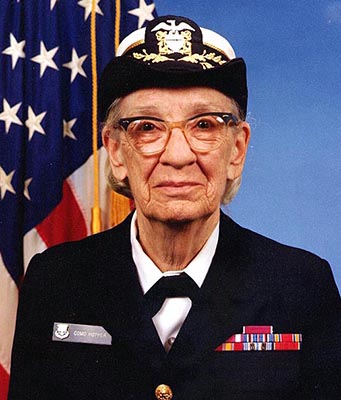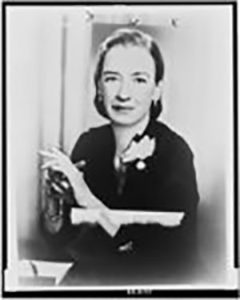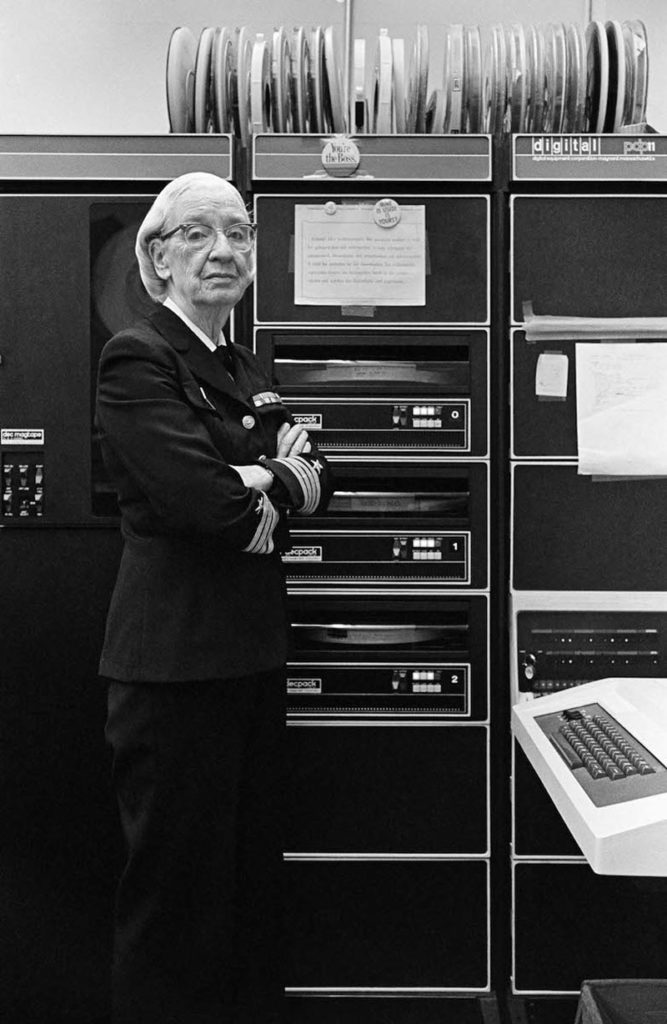Mathematician, Navy Veteran, Arlington Resident
Grace Murray Hopper broke down gender barriers throughout her career in the emerging field of computer science.
Ironically, her many accolades even included being named the first computer science ‘Man of the Year’ in 1969 by the Data Processing Management Association.

Grace Hopper 1984 - US Government Public Domain
Born in 1906, in New York City, Grace Murray Hopper, nee Grace Brewster Murray was raised in a time most when women were expected to not pursue careers. After the Great Depression employed women were perceived as taking jobs from men deemed to have a greater need to support their families.
However Grace Brewster Murray was raised in a family where education mattered. Murray attended Vassar College for her undergraduate degree in mathematics and physics. She completed her master’s and doctoral degrees in mathematics at Yale in 1930 and 1934, respectively, while continuing to teach at Vassar. Between 1934 and 1937, Yale awarded only seven doctorates in mathematics, and only one to a woman, Murray.

Image courtesy of the Library of Congress
Hopper, as she was then known (she married in 1930 and divorced in 1945 but kept her married name for the remainder of her life) taught until 1943 when she felt that she should enlist in the military to support the war effort.
During World War I, women were accepted into the Navy as Yeomen (F), which was the first time women were allowed into the armed forces as anything but nurses. Navy enlistment was once again opened to women in 1942 via the women’s auxiliary WAVES unit (Women Appointed for Voluntary Emergency Service). The Rear Admiral who presented the idea to the Senate stated they expected enlistment “will probably go up around 10,000 before we get through with it,” clearly not expecting the almost 100,000 women who served in the Navy before the end of World War II.
Hopper was accepted on her second enlistment attempt and she graduated at the top of her WAVES class after a 60-day officer training. Gender bias was evident, however, as Hopper received a commission that read “I do hereby appoint him a Lieutenant (junior grade) of the U.S. Naval Reserve.”
When Hopper reported to the Navy Liaison Office at Harvard in 1944, she did not expect to be given only one week to comprehend the workings of the Mark 1 computer. Fortunately, Hopper’s lifelong interest in many disciplines and deep understanding of mathematics provided her the foundation to quickly interpret the groundbreaking technology.
While working on the Mark II computer in 1947, Hopper and her team found a moth inside the inner workings of the machine, which had prevented the relay from operating. Although at the time they did not use the term ‘debugging,’ to describe the incident, this anecdote has been widely used to source the phrase. The remains of the moth are preserved safely inside the group’s log book at the Smithsonian Institution.
In 1949, Hopper entered the private sector to work on the UNIVAC I commercial computer, but remained in the Naval Reserve. The UNIVAC I required original work on a compiler system that would convert one programming language into another. FLOW-MATIC was developed for the UNIVAC system, and via the CODASYL (Committee on Data Systems Language) consortium, Hopper developed COBOL (Common Business-Oriented Language) which was adopted by the Department of Defense and standardized in the 1960s.
Hopper remained in the Naval Reserve after she entered the private sector in 1949 to work on the UNIVAC I commercial computer. Here, she began original work on a compiler system that would convert one programming language into another. FLOW-MATIC was developed for the UNIVAC system, and via the CODASYL (Committee on Data Systems Language) consortium, Hopper developed COBOL (Common Business-Oriented Language) which was adopted by the Department of Defense and standardized in the 1960s.

Image courtesy of Lynn Gilbert copyright 1978
Although Hopper attempted to retire from the Naval Reserve as a Commander in 1966, she was recalled to active duty in 1967 and served as the director of the Navy Programming Languages Group as a Captain. Hopper retired a second time in 1971 but was recalled to active duty once again. She was promoted to Commodore, later renamed ‘Rear Admiral (Lower Half),’ making her one of very few female admirals.
Hopper had a passion for collecting, filling three apartments in RiverHouse in Pentagon City with the objects she treasured throughout her extensive travels and career. Six years after her final retirement, Grace Murray Hopper died at her home in RiverHouse on New Year’s Day, 1992. She was buried at Arlington National Cemetery with full military honors and posthumously received the Presidential Medal of Freedom in 2016, one of many military awards she received during her life. Her other awards include the World War II Victory medal, the Defense Distinguished Service medal, two National Defense Service medals and three Armed Forced Reserve medals.
Her biographer, Kathleen Williams, describes her as a person with “an intense focus, a tireless dedication, and an irrepressible urge to innovate.” In addition to her many honorary degrees, titles and accolades, the largest gathering for women in computing is named in her honor, with more than 15,000 women attending each year. Arlington County maintains a park on the grounds of RiverHouse in her honor.
References
Billings, C. W. (1989). Grace Hopper, Navy Admiral & Computer Pioneer. Hillfield, NJ: Enslow.
Grace Murray Hopper (1906-1992): A legacy of innovation and service. (2017, February 27). Retrieved from https://news.yale.edu/2017/02/10/grace-murray-hopper-1906-1992-legacy-innovation-and-service
Lee, J. (n.d.). Grace Brewster Murray Hopper. Retrieved from https://history.computer.org/pioneers/hopper.html
Learn More
“Grace Hopper: Admiral of the Cyber Sea” by Kathleen Williams in Library of Naval Biography, Naval Institute Press, 2012.
“Grace Hopper: Queen of Computer Code” by Laurie Wallmark
“Grace Hopper and the Invention of the Information Age” by Kurt Beyer
Watch a popular video of Grace Hopper lecturing at MIT: https://www.youtube.com/watch?v=ZR0ujwlvbkQ
"Preservation Today: Rediscovering Arlington" is a partnership between the Arlington Public Library and the Arlington County Historic Preservation Program.
Preservation Today: Rediscovering Arlington
Stories from Arlington’s Historic Preservation Program
Arlington’s heritage is a diverse fabric, where people, places, and moments are knitted together into the physical and social landscape of the County.
Arlington County’s Historic Preservation Program is dedicated to protecting this heritage and inspiring placemaking by uncovering and recognizing all these elements in Arlington’s history.
To learn more about historic sites in Arlington, visit the Arlington County Historic Preservation Program.
RiverHouse Apartments is in Pentagon City, not Rosslyn! It’s just two blocks from the Aurora Hills Branch Library.
Nora,
You are absolutely right. We got RiverHouse mixed up with River Place in Rosslyn. RiverHouse is, as you point out, in Pentagon City and that is in fact where she lived. We have edited the post to reflect the correct location.